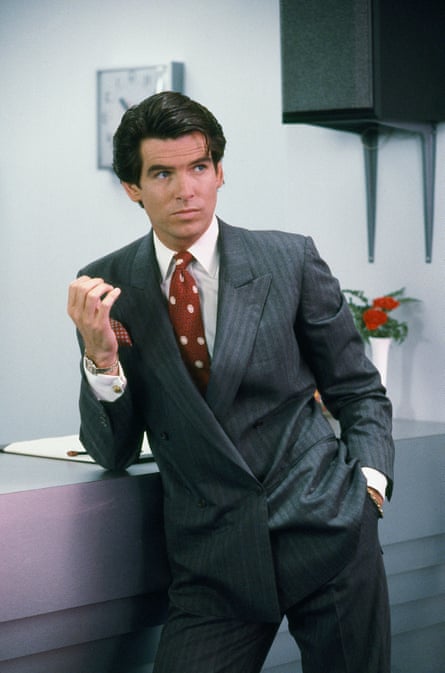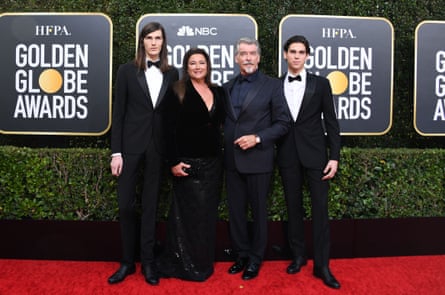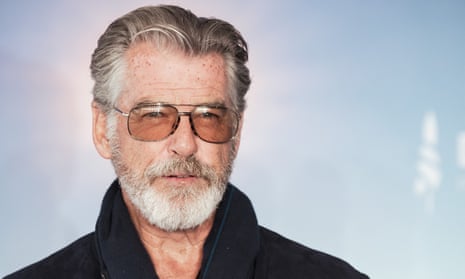I am 10 minutes into my Zoom interview with Pierce Brosnan when his son Dylan arrives off-screen with his father’s coffee. “Did you put sugar in this?” he says to the 23-year-old. “Some more milk, please, I don’t take mine black.” Dylan is sent back to correct it.
“He’s a wonderful musician and a great academic,” Brosnan says. “He just graduated from USC film school.” The graduation, like so many others, was cancelled. “We got him a cap and gown and sat here watching it [the online ceremony] on the sofa”.
Naturally, the pandemic has disrupted Brosnan’s schedule, too; he was shooting Cinderella in London until Covid-19 halted production. He returned to the northern shore of Hawaii, where he has remained since with his wife, the journalist and author Keely Shaye Smith, and their two sons, Dylan and Paris, 19. (Brosnan also has three children from his first marriage.)
“We are a close family and this time of covid has nourished and nurtured a bond between us all that probably would not have existed without the lockdown,” he says.
Brosnan is sitting at his kitchen table, in front of a bright Indigenous Australian painting, which he bought in Sydney during a “tour of duty” as James Bond. He is here to talk about his supporting role in the Netflix film Eurovision Song Contest: The Story of Fire Saga. The film, which was originally scheduled to coincide with this year’s contest, follows two would-be pop stars (Will Ferrell and Rachel McAdams) in their quest to represent Iceland in a fictionalised version of the competition.
There was hopeful expectation in some quarters that Brosnan might lend his singing voice, given his infamous performances in the Mamma Mia! films (his singing in the first film was so comical that it landed him the Razzie for worst supporting actor at the 2009 awards). Was he shocked not to be given the chance to sing on screen again? “I was surprised, I was disappointed, I was crestfallen,” he responds, good-naturedly.
Brosnan plays Ferrell’s disparaging father (“Which I thought was a bit of a long shot”), who resents his son’s wild ambitions and wants him to aspire to a more conventional future. It is not a parenting style familiar to Brosnan. “My boys are academic and have a creative instinct and intuition towards the arts. So I don’t try to direct them.”
His younger sons’ careers in film-making, acting (Dylan) and modelling (Paris) have seen them amass their own fame; they have social media followings in the tens of thousands. They stole the show at this year’s Golden Globes in their roles as ambassadors, shepherding celebrities on and off stage in black tie. Does their social media fame worry him?
“Yes, it does concern my wife, Keely, and I,” he says. “The footprint that they’re leaving will stay with them for many years to come. It’s treacherous waters. I went on Instagram to follow Paris, to make sure that he was acquitting himself well and not entering into any kind of liaisons with folk of ill repute. It’s a strange animal and you have to be careful with it. It can be narcissistic and you have to balance it out with human lightness.”
Born in 1953, Brosnan was raised in Navan, 30 miles north-west of Dublin. An only child, he has described his childhood as a solitary, Roman Catholic upbringing. “My father took off for the hills and, for my mother, it was a very difficult time in the 50s to be a single parent. So, in many respects, I created my own self,” he says.
After his father left, his mother moved to London when Brosnan was four. She wanted a better life for them. He waited for her in Ireland and lived in a succession of houses – with his maternal grandparents’, with his aunt and uncle, at a boarding house.
“I’m very grateful that I didn’t have the shackles of parenting, so to speak, and really cleaved my own path in life. When, as a young teenager, I told my mother that I wanted to be an actor, she was extremely supportive of that. She wholeheartedly said: ‘Follow your dreams.’”

Brosnan moved to Putney in west London when he was 12. At school, he was nicknamed Irish. “Being an Irish immigrant in London in ’64, they don’t let you forget that.” He later worked briefly as a commercial artist, but, having been raised on “cowboys and Indians, Old Mother Riley, Norman Wisdom”, he still dreamed of acting.
Brosnan stumbled upon the Ovalhouse theatre in south London and found himself “in the company of poets and musicians and outcasts and mangled souls”. His breakthrough came when he landed a small part in a Tennessee Williams play, The Red Devil Battery Sign, as the understudy.
“It didn’t work out for this other fellow,” says Brosnan. “I got the call: ‘Tennessee wants to see you now.’ I tore out of the flat and hopped on a bus. The bus was going too slow, so I got off and ran. My heart was pounding – Tennessee Williams wants to see me. I got to Tennessee’s apartment, and we read through two very emotional scenes and just let it fly. And I got the job.”
They opened at the Roundhouse theatre in north London in 1977, with Brosnan’s performance receiving critical acclaim. Williams sent him a telegram stating only: “Thank God for you, my dear boy.”
“It was an affirmation that I was on the right path, that I had the talent – a tiny bit of gold in my back pocket,” says Brosnan. “That made me hungry to be an actor. Once I found the world of acting, I clung to it with all my heart. It was liberating.”
It was a hugely successful start to a stage career, but Brosnan’s ambitions lay elsewhere. “I always dreamed of the movies,” he says. “The stage, as exhilarating as it was, always terrified me. I wanted to be up on the silver screen.”
In 1982, he landed the role of the charming TV detective Remington Steele. He moved to California with his first wife, the Australian actor Cassandra Harris, and their son, Sean, and her two children, Charlotte and Christopher, whom Brosnan later adopted. In 1987, Harris fell ill while filming in India and was diagnosed with ovarian cancer. She died four years later. Charlotte would die of the same disease in 2013.
Brosnan turned to the therapeutic qualities of painting while Harris was ill and he has continued ever since. “I started painting in 1987 when my late wife had cancer. I had been painting out of pain, and now the pain sometimes comes through in colour,” he said at the charity auction of his painting of Bob Dylan in 2018. It sold for €1.2m (£1.1m).
He found the fortitude to keep acting, too. In 1993, he made it on to the silver screen in Mrs Doubtfire. “At day’s end, you want to look around and hopefully you have a handful of films that you can be proud of participating in. That is definitely one of those movies for me.”
He speaks just as fondly of the film’s late star, Robin Williams. “I went into the makeup trailer and there was Robin, sitting in the makeup chair. He had a Hawaiian shirt on and cargo pants, and his hairy arms and hairy legs hanging out. He had the head of Mrs Doubtfire and greeted me: ‘Oh, Pierce! Oh, you look so handsome, oh, give us a kiss.’” (Brosnan’s Mrs Doubtfire impression is impeccable.)
At this point, Brosnan had already been offered the role of Bond, but had been obliged to refuse it due to his Remington Steele contract. When he made his Bond debut, in 1995’s Goldeneye, he made it count.
His iteration of Bond – sensitive, suave, serious – proved to be a huge success, critically and commercially. Hindsight has bolstered Daniel Craig’s gritty, brutish incarnation of 007 as the best since Connery’s, but Brosnan played the role with a twinkle in the eye and the humour that such a cartoonish character deserves.
After his final outing as Bond, Die Another Day in 2002, the producers felt the franchise needed a reboot to stay relevant in a post-9/11, post-Bourne world. Although Brosnan was keen to do a fifth film, the producers had settled on recasting the role and told him so over the phone in 2004; he would later say he felt he had been “kicked to the kerb”. “There’s no regret,” he says now. “I do not let regret come into my world … It just leads to more misery and more regrets.”
“Bond is the gift that keeps giving and has allowed me to have a wonderful career. Once you’re branded as a Bond, it’s with you for ever, so you better make peace with it and you’d better understand that when you walk through those doors and pick up the mantle of playing James Bond.”
Since relinquishing the role, Brosnan has generally been reticent about later instalments (“Not my monkey, not my circus,” he said in an interview with Esquire last year). He has, however, said enthusiastically that it is time for a woman to take over the role (“Get out of the way, guys, and put a woman up there!”). Why does he think there is so much resistance to recasting the role of Bond (and other iconic British figures, such as the Doctor in Doctor Who) as a woman or a person of colour?
He pauses and slowly taps his kitchen table. “I’m gonna leave that right there,” he says, with a knowing smile and a single, slow shake of the head.
Brosnan has had a successful career since leaving the franchise – his performances in The Matador, for which he earned a Golden Globe nomination, and Mamma Mia! stand out – and he was not hampered by the weight of the role he left behind.

In 2010, Brosnan starred as a fictional British former prime minister accused of war crimes (yes, he based his performance on Tony Blair, he says) in Roman Polanski’s thriller The Ghost Writer. What does he make of the criticism of those who work with Polanski, given his rape conviction?
Brosnan is silent for a full 10 seconds. “Well,” he says, steadily, “I took to the role and to the part in The Ghost Writer because of the work that Roman has done as an artist, as a director. I didn’t let the rest of his life influence my choice. I had to be honest with myself and know that justice had been done, half undone, and went forth as an actor.”
Would he make the same decision again today?
“I don’t know if, in this climate, I would have made the same decision, the same choice. These are dangerous times and it’s a very toxic world. I don’t know.”
When he talks of the “climate”, it is clear he is referring to the world after #MeToo. “It was shocking,” he says of the scale of abuse powerful figures such as Harvey Weinstein got away with for so long. He punctuates every few words with a short pause. “It was absolutely appalling and really has changed the landscape and the workplace for women in Hollywood. It was a mighty fall from grace and one that was really ugly and sad for all parties concerned … that this man should have acquitted himself in such a fashion in the company of young women who were trying to make a career for themselves – it was upsetting to see that behaviour unfold on a daily, weekly basis.”
Brosnan has been prolific in recent years. He has four films in production and a fifth awaiting release.
“I have no desire to retire,” he says. “I am a man of 67 years now and the parts that will come to me will be the parts of the elder, the parts of the comedic turn. At this point in life, I don’t know what else to do but act and paint.”

In the immediate future, there is a pandemic to navigate and a US presidential election on the horizon (Brosnan is a dual citizen of Ireland and the US). More than once in our conversation, Brosnan laments “the disease of racism” and urges people to vote.
“Joe [Biden] has my vote,” he says. “We have to find leaders whom we can trust, leaders who have intelligence and empathy and compassion and get away from the toxicity that we have now in this country.
“I would like to think that the vaccine will come soon for the disease of corona. And I would like to think, also, a vaccine will come for the disease of racism and that we can really come together as communities to respect each other’s religions and beliefs and not to be so judgmental.”
He continues: “With change comes struggle. But I have hope in our young people, I have hope in my sons’ generation that they will see the awful, shameful neglect that we’ve paid to each other’s religions, race, the nature of our lives, the environment that we live in. I have the strongest belief that the youth of today will make a big change, will have the courage to get out and vote for the rights of people – not racism and not ignorance and malignant narcissism.”
If this sounds like wishful thinking, it is in keeping with Brosnan’s nature. “My eldest son said: ‘Dad is just a dreamer.’ But my dreaming has gotten me this far in life. So I shall continue dreaming and continue being the man I am and doing the best I can, with the tiny bit of gold talent that I’ve got.”
Eurovision Song Contest: The Story of Fire Saga is out now on Netflix
